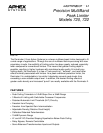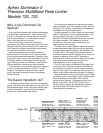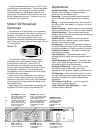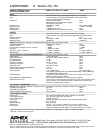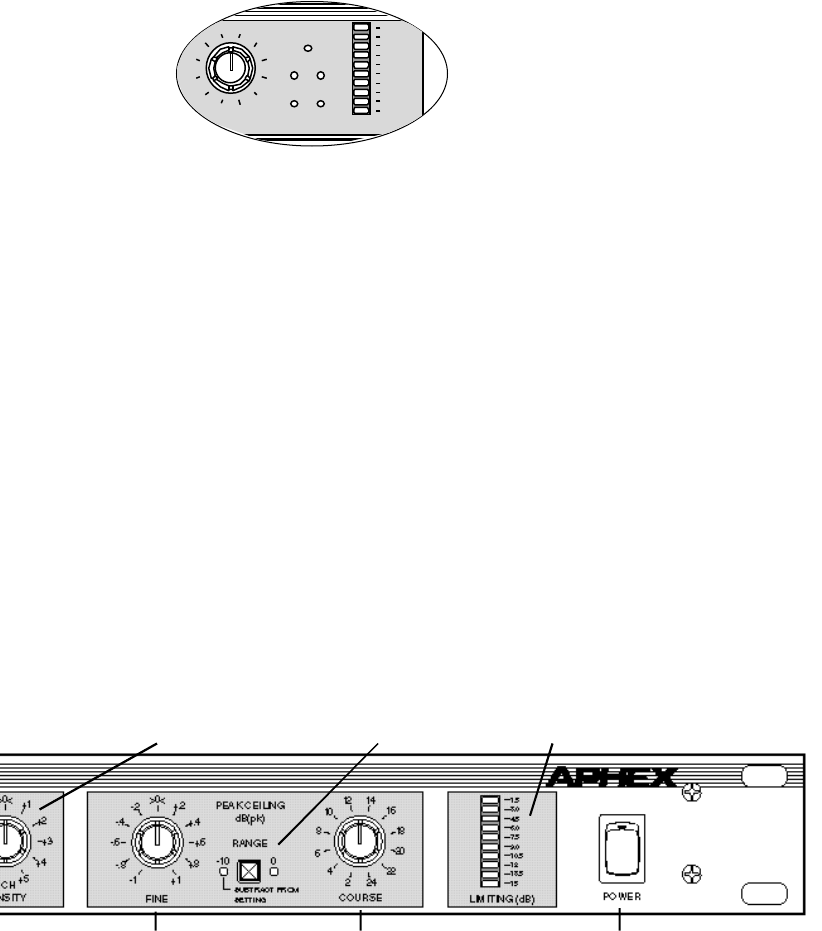
It should be noted that there is only one ALT circuit
controlling both channels equally. This provides global
stereo balance and imaging by assuring that both
channels always limit at the same threshold. This
does cause an interaction if the Dominator ll is used
as two independent channels. Therefore, we do not
recommend such a practice.
Model 722 Broadcast
Dominator
Pre-emphasis is an equalization curve expressed
as a time value based on the ratio of a resistor and
capacitor. The higher the value, the greater the
equalization. It has been employed as a noise
reduction technique for broadcast and transmission
links. There are primarily two world standards- 50 and
75 microseconds.
The Dominator ll Model 722, has separately
switchable pre and de-emphasis curves. When
pre-emphasis is switched in, either 50 or 75
microseconds, the equalization curve is added
after the input stage and before the limiters. When
de-emphasis is switched in, the complementary
de-emphasis curve is inserted after the final clipper
and before the output stage.
When both pre and de-emphasis are switched in
and when input is below threshold, the frequency
response of the output is flat. As the input increases
above threshold, the output takes the shape of the
de-emphasis curve.
When both pre and de-emphasis are switched out,
the Model 722 works exactly like the Model 720.
Applications
Sound Contracting — protection of amplifiers and
speakers from overload; increased loudness;
maximized use of available power.
Recording — preventing sudden peak overload of
mixer or recorder; tightening tracks; special eff e c t s ,
e t c .
Mixing — used as a program limiter, the Dominator ll
will keep a track “rock steady” for “layering” into or on
top of a mix.
Digital Sampling — obtaining good full scale samples
free from peak overload, i.e. no more missed samples.
Digital Recording — insuring clean recording by
stopping clipping of peaks and overshoots. Maximizes
bit usage for less distortion.
Satellite Uplink — Modulation control to prevent
splattering on high frequency audio, gives reduced
distortion, better signal-to-noise.
Broadcasting — AM and FM modulation control for
increased loudness; cleaner sound; use in production
for greater consistency of tapes, punchier voice-overs.
Location Film Shoots — anti-crash for dialog and
sound effects recording.
Post Production — Soundtrack peak control;
managing difficult dialog; controlling transient sound
effects.
Optical Recording and Transfer — prevents “valve
clash”, gives higher average level with low distortion
and better signal-to-noise performance.
Analog Disk Mastering — peak control for high
allowable average cutting levels; less limiter
degradation to the program; brighter, punchier sound.
C/D Mastering — peak and density control for more
accurate digitizing, cleaner sound requiring less error
correction on playback; no limiter induced sound
degradation.
STL & Phone Line Driver — maximize signal-to-
noise without overload distortion.
Video and Audio Tape Duplication — “Hotter”
transfers without saturation.
POWER - switches
AC mains on and off.
“Off” position engages
bypass relays.
ach
and of
nnel
of
he
en
om
RCH DENSITY - adjusts
the Relative Crest Height
(RCH) of the output.
The higher the RCH
(clockwise) the louder the
output. The lower the
RCH (counter-clockwise)
the lower the average
level in the output.
FINE - adjusts the
PEAK CEILING by
±1dB in 0.2dB steps.
RANGE - when switched
to the “.10” position it adds
a 10dB boost in the input
and a 10dB cut in the
output. The PEAK CEILING
is therefore 10dB lower
than the settings shown
on COARSE and FINE
controls.
COARSE - switches
the PEAK CEILING
in 2dB steps from +2
to +24dB(pk).
LIMITING (meter) -
displays the limiting
(from gain reduction
and clipping) in the
channel with the
greatest amount of
limiting.
Model 722



